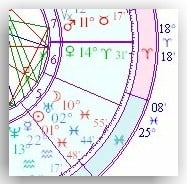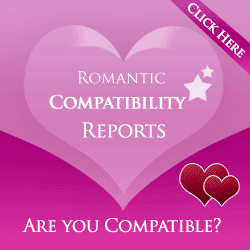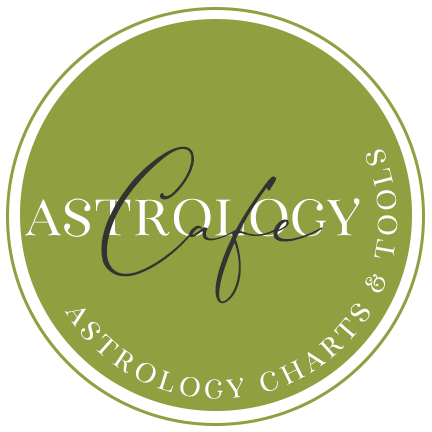Relationship Potential
determining relationship potential in the natal chart:
Synastry & Relationship Astrology
In this article:
- A closer look at the natal chart in the study of relationship potential;
- Issues of projection and repression, and their relation to the twelfth house, the seventh house, Pluto, and Saturn;
- The quincunx aspect;
- Characteristics of specific planetary aspect pairs in the natal chart;
- The seventh house ruler;
- Planets and points in the seventh house;
- Sun-Moon natal aspects.
Synastry & Relationship Astrology: Relationship Potential
When we embark on a relationship analysis, it is always imperative to take a look at the individual’s charts and study relationship potential in each natal chart. We have all heard that we must learn to love ourselves first before we can love others in a healthy manner. We must also look to our own natal charts to see exactly what we expect from our relationships, and what potential issues we are likely to attract through our relationships with others.
 Many significant issues within ourselves are faced in intimate relationships, and will not be apparent in impersonal (or non-personal) relationships. Because we don’t have a deep personal investment in a casual relationship, there is no threat or perceived threat of loss of self in more superficial relationships.
Many significant issues within ourselves are faced in intimate relationships, and will not be apparent in impersonal (or non-personal) relationships. Because we don’t have a deep personal investment in a casual relationship, there is no threat or perceived threat of loss of self in more superficial relationships.
Some themes that are commonly expressed when relating intimately with others should be mentioned here. Projection is one such theme. When we project a trait or a feeling onto someone else, we experience this trait or feeling as coming from the outside, when in reality it is our own disowned feeling or trait. We have disowned some quality or attitude that is part of ourselves, as expressed in the natal chart.
Sometimes, we disown and project traits because we are not ready to face up to or take responsibility for the projected behavior, attitude, or trait. When we project it, we are also projecting responsibility onto someone else. We position ourselves into a passive role, and the person who we have projected a behavior onto becomes the aggressor.
We all are guilty of projection from time to time. An example of projection is the case of a jealous spouse. When he sees his spouse talking to a person of the opposite sex, he may jealously imagine that the conversation is more intimate than it actually is. It may be traced to his own fear that he himself won’t be faithful, or that if he were in the same situation, he may be tempted to “cheat”. He does not want to admit this to himself, let alone others, so he projects the potential for infidelity onto his spouse.
In close relationships, we often attract or are attracted to people who express traits that we have “disowned”. All of us could benefit from stopping to think about what angers or irritates us the most about our partners. Is it possible that we are projecting these traits onto our mates, or that we have attracted a person with these traits in order to make up for the lack in our own personalities? Relationships can be the most revealing learning experiences about ourselves if we are open to learning from them, and if we are being honest with ourselves.
Projection most commonly occurs at the Descendant, with oppositions, and sometimes with Saturn. The Descendant and seventh house reveal what we are looking for in others, and these traits may be those that we disown or project onto others.
Venus oppositions in the natal chart can also point to projection. The other planet (the planet that Venus opposes) may be projected onto partners in love relationships. With Moon oppositions in the natal chart, we may project our own emotional state onto others, and, as a result, experience the other planet in our intimate relationships.
The twelfth house can also sometimes indicate projected qualities, but more often show parts of our own personalities that aren’t easily integrated into the rest of us because they are not easily accepted. Qualities of the twelfth house may be repressed (as opposed to projected), and are different than the seventh house in that we experience them more indirectly.
When we meet our twelfth house in others, we are less apt to jump up and declare that person “the one” like we might do if we meet our seventh house in a person. Instead, we might feel uncomfortable in their presence, but somehow drawn to the experience. When we experience a person activating our twelfth house, we tend to come more in touch with hidden traits and emotions within ourselves.
Repressed “material” may show itself through self-defeating attitudes and behaviors. We don’t experience these qualities directly, but rather we meet up with them through fantasy or addictions. Shame and repression are often signified by the twelfth house and Saturn.
Saturn represents our shame that is a result of not meeting standards of perfection or rigid rules. The twelfth house shows parts of our personality that we felt were rejected perhaps in early life by our parents or the people around us, or if we believe in reincarnation, by experiences in our past lives. Repressed qualities can easily become distorted and hurtful towards others and towards ourselves.
Where we find Saturn in our charts can be clues to areas where we feel a certain amount of shame and we may attempt to overcompensate. If we do not face these issues in ourselves, we carry them into our relationships. Sometimes we enforce suffering on people closest to us in order to deal with our own shame.
Pluto, when associated with relationships in the natal chart, can signify a person who totally identifies with their relationships, sometimes to the point of obsession. In their attempts to control the direction of their relationships, they can create dependencies in both themselves and their partners. They may fear being abandoned, and go to great lengths to keep their partner attached to them.
This fear can be a self-fulfilling prophecy, as the very methods they may use to keep their partner attached to them may drive their partner away in the end. The need to experience an intense attachment is present. Manipulativeness may be a theme.
When we manipulate our partners, we are effectively telling ourselves that we cannot affect our environments in a healthy, direct way, and we undermine ourselves as well as others. We fear that we are ineffective. When we strive for power in our relationships, we may tell ourselves that we are looking for ways to get closer to our mates, but in fact we are actually alienating ourselves from them. However, a positive expression of Pluto as a significator of relationships is the ability to attain intimacy and intensity without the need for subversive tactics.
 When we see personal planets, especially the Moon and Venus, involved in one or more quincunxes (or inconjuncts as they are sometimes called), we know the native has some problems with confidence. These people can easily become doormats, and allow themselves to be used or taken advantage of. Read our article on this aspect, the quincunx, for more information on how to deal with these rather tricky aspects.
When we see personal planets, especially the Moon and Venus, involved in one or more quincunxes (or inconjuncts as they are sometimes called), we know the native has some problems with confidence. These people can easily become doormats, and allow themselves to be used or taken advantage of. Read our article on this aspect, the quincunx, for more information on how to deal with these rather tricky aspects.
When the ruler of the seventh house is involved in a quincunx, one can expect that this tendency to undervalue oneself, and perhaps be taken advantage of as a result, may be a theme in one-to-one partnerships.
Look to the condition of Venus in the natal chart, and to the Venus sign for some clues about relationship needs.
Sun-Venus people can identify strongly with their relationships. They are usually quite romantic and charming, and they are generally very open to love.
Moon-Venus people are often very hospitable people who may be easily taken advantage of. They generally avoid hurting people’s feelings, and are quite sensitive and often somewhat dependent on their partners.
Venus-Saturn people often associate love with responsibility. They are usually quite committed to their partners and they take their relationships seriously, but they may feel very lonely at heart. They do not always feel completely at ease expressing their affections. This aspect is expressed in a variety of ways. One man with a Venus-Saturn conjunction (in Aries) has been married for almost 20 years, and plans to stay married. However, he claims that he has never been “in love” and never expects to be. Sometimes there is an attraction to people who are unattainable.
Venus-Uranus people can be quite willful in their partnerships. They may resent their partners controlling them in any manner. They are often attracted to unusual or non-traditional relationships, and can be sexually curious and experimental.
Venus-Neptune people have a real romantic view of relationships. They may be seeking an ideal partnership and invest much hope into relationships as a means to rise above the mundane affairs of their lives. They can be prone to disillusionment in partnership because of a tendency to gloss over problems, even glaring ones, in relationships. When Venus is in hard aspect to Neptune, the natives can swing from trusting too much to suspicion. It can be challenging to see the partner clearly, as he or she takes on inhuman proportions.
Venus-Pluto people desire total commitment and intimacy with their partners. They may attempt to control or possess their partners, or they attract partners who are controlling. They can be quite dramatic about their affections.
When relationship significators are connected with the twelfth house, there may be a tendency to either keep relationships rather sheltered and private, or to be attracted to secret affairs or relationships. There is often a deep, inner need to look for support from a lover, and some pleasure taken from keeping it private.
This can happen when the ruler of the seventh or fifth house is posited in the twelfth house, or the ruler is strongly aspecting a planet in the twelfth house or the ruler of the twelfth house. The ruler of the twelfth house posited in the seventh house is a little different. It often suggests that the native is prone to attract partners who represent “disowned” traits in the personality. This can be challenging for many, especially if unaware of this tendency, and the result can be rather compulsive and tumultuous relationships.
With Venus retrograde, relationships are taken very seriously, and even more so if Venus is a relationship significator (if it rules the seventh house, for example, or is found in the seventh house). There can be a tendency to limit opportunities to find love, even though–and because–love is so very important to the native. It is hard for the native to be objective when it comes to relationships and social affairs, and there is great sensitivity to ups and downs of partnership. Casual relationships are not considered very valuable to the Venus retrograde native, and relationships are rarely entered into lightly.
We have seen that the seventh house represents “Other”, as it is directly opposite the first house which represents the self. The seventh house represents the mirror, or relative identity. It is through the seventh house that we try to strike a balance, through cooperation or competition.
The ruler of the seventh house and its position by house can sometimes show where the native meets their partner, but this only happens in some cases. For example, the ruler of the seventh in the sixth house sometimes indicates that the native meets a significant other at work; in the ninth house, at school or another institution of learning, in a foreign land, or marriage to a foreigner, and so forth.
However, the house position of the ruler of the seventh house more often reveals important information about the nature of the partnership, the nature of the partner, and about relationship needs. So, a person with the ruler of the seventh house in the sixth may attract a partnership that is decidedly unequal, as this is the nature of the sixth house. There may be an attraction to a partner who is considered an “underdog”, for example.
The ruler of the seventh house also shows facets of the native’s personality that are strongly played out in relationships. Check the aspects this ruler makes. These are personality dynamics that are most apparent in partnerships.
People with planets in the seventh house are attracted to partnerships, in part, to fulfill the needs associated with that planet. In some cases, that facet of the personality (represented by the energies of the planet in the seventh house) feels underdeveloped in one’s own life, and there is a drive to experience it more fully through relationships. This is why a heavily-posited seventh house often suggests a person who is especially attracted to one-on-one relationships or partnerships.
With personal planets in the seventh house of the natal chart, a person may feel a strong need for a partner to fulfill basic needs in one’s own personality, which can ultimately weaken a partnership if the native doesn’t take on more responsibility for that part of his or her own personality.
The Sun in the seventh house suggests a person who negotiates and compromises. Partnership is important to the native, and one’s identity is heavily wrapped up in partnership. The ego comes into play in relationships, and there can be a tendency to focus a little too heavily on keeping scores and trying to balance things out. Most important here is to avoid losing one’s identity in a partnership, because it will wear the person down and resentment of the partner is quite possible.
With the Moon in the seventh house, the native experiences a powerful neediness in relationships. The emotional connection to the partnership is strong. The drive to care for, and to be cared for, in a relationship is strong, and a relationship that fails to meet one’s emotional needs will ultimately be unsatisfying.
With Mercury in the seventh, the native’s self-expression and ability to communicate comes alive in partnership. This person needs to be heard in order for the relationship to be satisfying.
Venus in the seventh house suggests a strong need for harmony and balance in a partnership. The native has a hard time dealing with insensitive or volatile relations and strives for peaceful co-existence with a partner. The native avoids “rocking the boat”, which can ultimately weaken a partnership.
With Mars in the seventh house, the native feels alive through partnership, and sometimes will depend on a partnership to feed his or her drive and stores of energy. A relationship that is too peaceful or placid may leave the native feeling dissatisfied. He or she is looking for an active partnership, and may depend too much on a partner for motivation, disowning his or her own drive. That may be too much responsibility for a partner to bear in the long run.
Outer planets in the seventh house are less about disowning a part of ourselves, and more about qualities that we seek in our partnerships.
With Jupiter in the seventh house, we look for a partner who is generous and high-minded in spirit. The native needs to feel that he or she is growing through a partnership, and has a hard time finding a partnership that seems to be stagnating satisfying.
Saturn in the seventh house has has a bad rap. In my experience, this position of Saturn does not seem to deny or delay marriage. I have seen enough people with Saturn in the seventh who have married young, and whose partners are not considerably older than them.
However, it does suggest a gravitation to a responsible and mature partner, as well as a heavier and more serious view of partnership than average. The native takes their partnerships seriously and will usually go to lengths to fulfill their responsibilities in partnership. The native has a hard time dealing with excessive neediness in a partner, and often feels a lot of pressure in and through a partnership. If trust is compromised, there may be a tendency to withhold affection. The person may “go through the motions”, but will withdraw emotionally when hurt or slighted.
A person with Uranus in the seventh house often is drawn to a partnership that breaks some of the traditional “rules”. There is a need for space and freedom within partnerships. Natives with this placement of Uranus need to be careful that their need for a unique and untraditional partnership doesn’t eclipse a true connection with the partner.
Neptune in the seventh house suggests an attraction to a partner who is in need of help or who comes to one’s own rescue. The desire for a spiritual connection to a partner is strong, but there can be a real problem seeing the partnership clearly, and, if this is the case, it is easy to feel taken advantage of.
Pluto in the seventh house suggests an attraction to partnerships that turn the life inside out. The tendency to be fearful of losing a partnership is common with this placement. The native may attract partners who are possessive, and if this is the case, it is usually because he or she is projecting his or her own fears of being abandoned onto partnerships.
Chiron in the seventh house suggests a certain defensiveness in partnerships. There can be a fear of opening oneself up to partnership, and a tendency to bend over backwards to be “fair” with a partner. If the native skirts emotional issues out of fear of rocking the boat, he or she puts undue pressure on the partnership.
The South Node in the seventh house suggests a tendency to form, and to fall back on, co-dependent relationships due to a fear of independence and of standing alone. The native fears asserting themselves and will need to face this fear of standing alone at some point in the life time. Striving for internal peace, rather than focusing on achieving peace and balance in relationships, will improve the native’s relationships, but generally the native will struggle a little along this path.
The situation is reversed with North Node in the seventh house which suggests a tendency to rely on the self so much as to alienate important others in the life, to be excessively competitive to the point of a me-first attitude, to take things personally, and to be impatient, rash, and impulsive at the expense of personal happiness.
The native needs to work on sensitizing themselves to the needs of others and to stop shrinking from the demands that a partner might put on them. Through partnership, and through cooperation with others, the native will attain inner balance, but there can be a struggle along this path.
Sun-Moon Aspects in the Natal Chart
People born with a Sun-Moon tension can spend much of their lives struggling to balance the principles of the Sun and the Moon within their personalities, and will bring this struggle to some degree into their relationships. The urge to form meaningful relationships is generally powerful, but relationships can be as much of a struggle to these natives as the inner conflict is to themselves.
This inner conflict occurs with the square, opposition, and quincunx. The desire to find meaningful relationships is stronger than it is when the natal Sun and Moon form a sextile or trine, and early relationships in particular can be challenging until the stressful aspects are recognized as an inner tension.
A woman with Sun opposition Moon, who had lived through her parents’ difficult divorce as a child, complained that her husband seemed to be quite complacent about their marriage, simply expecting that it would work out without much effort. His Sun and Moon form a sextile. When faced with a relationship problem, her instinct was to work on it actively, but her husband did not see such a need. In fact, he did not “see” the problems as clearly as his wife did. He felt that she was looking for problems that didn’t exist, while she felt he was taking the relationship for granted by not addressing problems as they arose.
A stressful Sun-Moon aspect seems to imprint the native with the (often unconscious) expectation that relationships can very easily fail, and the natives will be especially aware of conflicts in partnership, taking them to heart. The upside of this natal conflict is found in this sensitivity itself!
Those with a Sun-Moon opposition, in particular, are generally willing to work out problems in a relationship due to their acute awareness and sensitivity to the conflicts that arise in their partnerships. However, if they face a partner who denies the problems exist in the first place, as in the example above, they can easily become frustrated. This is because learning and growing through relationships is a basic urge – so basic that it is a need. These natives are learning about themselves through their relationships, and need partners who are willing to be a part of that process.
Sun square Moon suggests an internal “war” between two equally powerful desires: the desire for emotional commitment and the desire for autonomy. The native can be quite defensive and even belligerent with others, and often over-sensitive, which can take its toll in personal relationships. Partners may complain that the native often seems to be spoiling for a fight, and relationships can be turbulent until the native learns to compromise.
Sun quincunx Moon in the natal chart suggests an individual who seems to live life constantly making adjustments and concessions. There can be a tendency to offer too much followed by feelings of being taken advantage of. Passive-aggressiveness can be a problem as well.
The native seems to expect that they have to make compromises in life in order to get what they want, but in the process, undervalues their own needs. Partners may complain that the native is indecisive, unsettled, and unfocused. The native needs to work on accepting both the Sun and the Moon in his or her personality in order to feel whole and to avoid sabotaging relationships (and life goals) with self-defeating attitudes.
When the Sun and Moon are sextile or trine, the native is unmistakably accepting, although rather strong-willed as well. There can be a tendency for the native to expect to get what he or she wants, simply because the desire nature is at peace within themselves. Complacency is a possibility and often a complaint of the native’s partners. However, the ease with which this native deals with others can certainly be an asset.
Sun conjunct Moon in the natal chart suggests a strong-willed individual who is also rather subjective. The native is quite comfortable with themselves, which is helpful for focus and concentration, but can be challenging in partnerships because of a rather insular and self-reliant personality. Lack of objectivity can be a problem, as the native tends to take things quite personally and is rather self-involved and self-contained. In intimate relationships, there is a decided lack of flexibility in the nature that can be frustrating to partners.
Next: The Composite Chart
See also Synastry House Overlays article
Synastry Hub page
References & suggested further reading:
(1) Relationship Analysis by Robert Blaschke. {affiliate link}
(2) Love Formulas-2 by Nance McCullough. {affiliate link}












